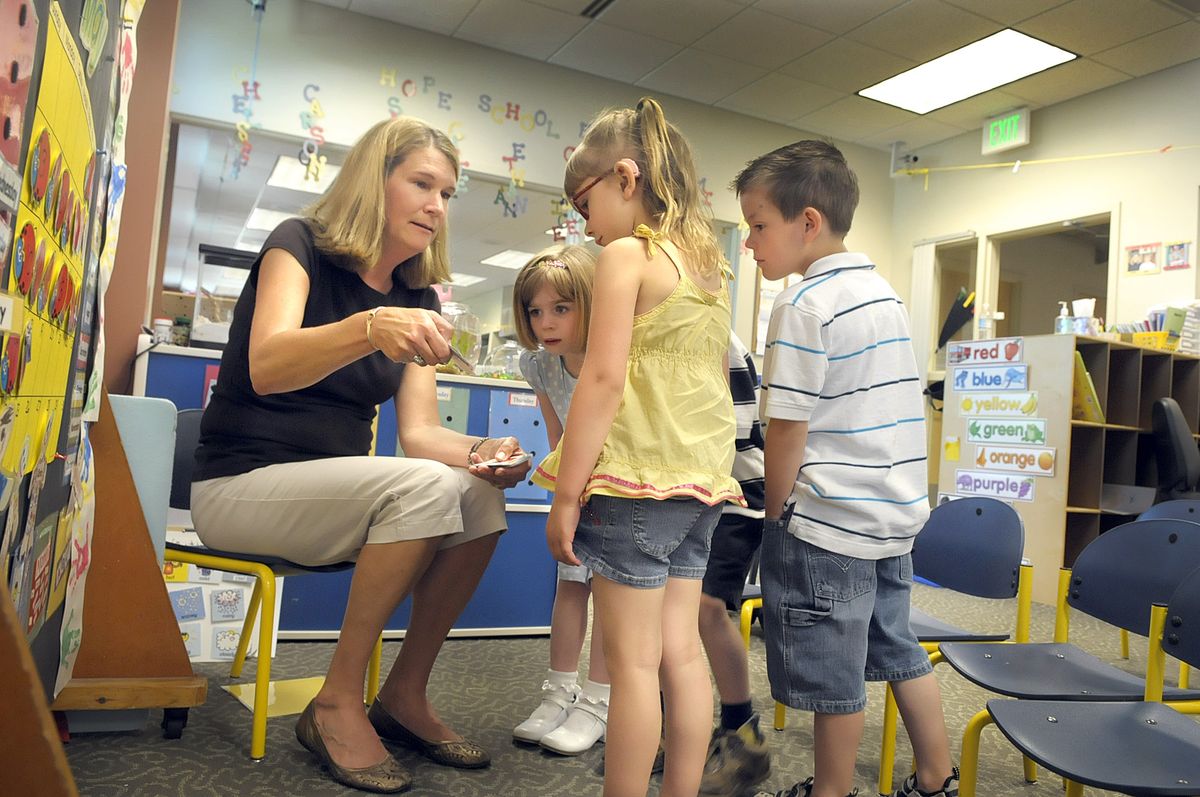Words of HOPE reach hungry ears
Program teaches hearing impaired, hearing children

The classroom at HOPE School looks like most other preschool classrooms: sweet potatoes are sprouting on the windowsill, the betta fish swims around in its aquarium and a couple of caterpillars are growing big and fat in a little plastic dish. Today’s topic is seeds and how different plants grow from different seeds.
Gathered around teacher Amy Hardie and instructional assistant Jennie Wheaton are five preschoolers working on their daily “jobs” – learning the calendar, singing out the names of the months, figuring out what the weather is like outside and taking attendance.
On first sight, no one would know that four of the students have profound hearing loss.
Some have cochlear implants, some have hearing aids, but as they sit on their little chairs, squirming a bit during story time, they interact with the teacher just like hearing kids would.
HOPE School doesn’t use sign language. Instead, hearing children are there as language models.Wheaton
The idea is that by having hearing and speaking role models around them, deaf and hard-of-hearing children learn how to speak faster.
“It has been a pretty amazing journey,” said Karen Rhatigan, whose 6-year-old daughter Clarice has been at HOPE School for two years. “When we got here she couldn’t talk at all.”
Clarice has profound hearing loss, Rhatigan explains, and she used to worry a lot about her daughter’s future.
“First you worry, ‘Is she ever going to hear me?’ ” Rhatigan said. “Then you wonder, ‘Is she ever going to say mama? Will she ever talk to me? Will she be able to talk to her friends?’ ”
Today, Clarice has answered most of her mom’s questions by catching up on her language to such a degree that she is now ready for kindergarten in an ordinary school – without any special help other than her cochlear implant.
“She’s just ready,” Rhatigan said. “I never thought I would say that.”
HOPE School is a listening and spoken language program, which used be called an auditory oral school.
The idea behind using other children as “hearing peers” or “spoken language models” is that deaf or hard-of-hearing children learn how to speak faster when around children who hear and speak on an age-appropriate developmental level.
“You have got to have good role models,” said Kim Schafer, who coordinates the outreach for HOPE School. “It just makes it easier for them to learn how to speak.”
The school has been open since September 2004 and many of its small graduates now function in mainstream schools just like their hearing peers.
“When you get that early intervention, it saves the school districts money in the long run,” said Wheaton, a speech and language pathologist and the instructional assistant at HOPE. “Look at someone like Clarice – she’ll be fine in school from now on.”
The Rhatigans live in the Medical Lake School District, which has been “very helpful” to the family’s effort to send Clarice to HOPE School, Rhatigan said.
“They recognized right away that this was a good thing for Clarice,” Rhatigan said.
HOPE School is a private nonprofit on the Riverpoint Campus in the Health Sciences Building. Both Eastern Washington University and Washington State University support the school by providing free classroom and playground space, technical support and other office-related services. In return for these in-kind donations, graduate students from EWU’s Communication Disorders program and WSU’s Speech and Hearing Sciences program may include working at HOPE School in their clinic experience.
“It’s a cooperative program between the two schools,” said Wheaton. “The graduate students don’t work with the kids unsupervised, of course.”
HOPE School also offers a toddler group on Friday mornings.
“It’s a small feeder program for us,” Wheaton said. “But it’s also a place for parents or caregivers to interact with each other and for our teachers to model language for the kids.”
Christina Yates learned about HOPE School because her daughter was a hearing and speech peer.
Now her 5-year-old son Micah Yates attends. Micah has profound hearing loss and has had a cochlear implant since he was about a year old, Yates said.
“We did sign language with him in the beginning, but now we don’t do it anymore,” said Yates, who plans to home school Micah along with her other children.
She said the most amazing part about Micah’s development at HOPE School has been that today most people can’t tell he is hard of hearing.
The other day at the grocery store, a woman mistook Micah’s colorful cochlear implant for a lollipop.
“She said, ‘Your son has a lollipop stuck in his hair,’ ” Yates said, “and I explained that it was his implant. She never even noticed that he is hard of hearing.”